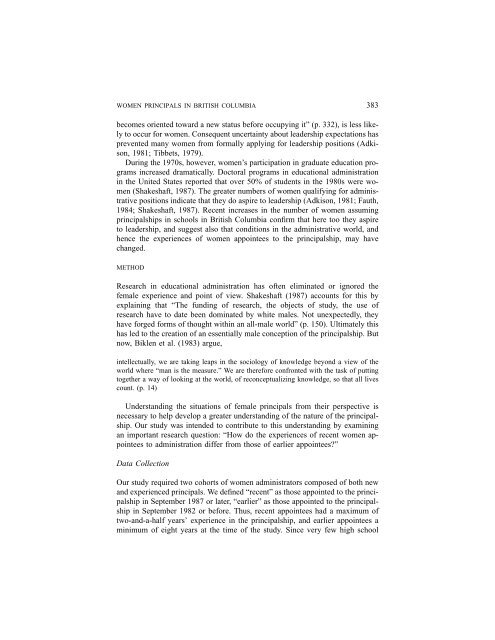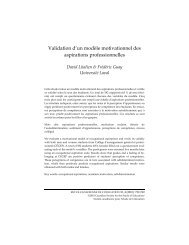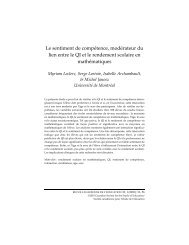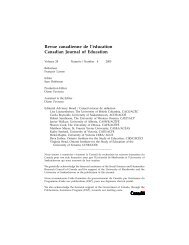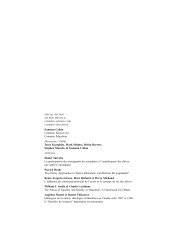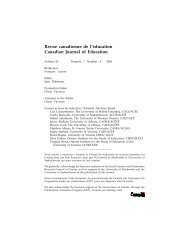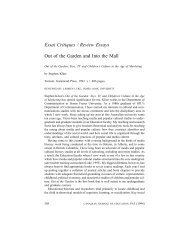Mireille Falardeau et Michel Loranger Le choix de stratégies ... - CSSE
Mireille Falardeau et Michel Loranger Le choix de stratégies ... - CSSE
Mireille Falardeau et Michel Loranger Le choix de stratégies ... - CSSE
You also want an ePaper? Increase the reach of your titles
YUMPU automatically turns print PDFs into web optimized ePapers that Google loves.
WOMEN PRINCIPALS IN BRITISH COLUMBIA 383<br />
becomes oriented toward a new status before occupying it” (p. 332), is less likely<br />
to occur for women. Consequent uncertainty about lea<strong>de</strong>rship expectations has<br />
prevented many women from formally applying for lea<strong>de</strong>rship positions (Adkison,<br />
1981; Tibb<strong>et</strong>s, 1979).<br />
During the 1970s, however, women’s participation in graduate education programs<br />
increased dramatically. Doctoral programs in educational administration<br />
in the United States reported that over 50% of stu<strong>de</strong>nts in the 1980s were women<br />
(Shakeshaft, 1987). The greater numbers of women qualifying for administrative<br />
positions indicate that they do aspire to lea<strong>de</strong>rship (Adkison, 1981; Fauth,<br />
1984; Shakeshaft, 1987). Recent increases in the number of women assuming<br />
principalships in schools in British Columbia confirm that here too they aspire<br />
to lea<strong>de</strong>rship, and suggest also that conditions in the administrative world, and<br />
hence the experiences of women appointees to the principalship, may have<br />
changed.<br />
METHOD<br />
Research in educational administration has often eliminated or ignored the<br />
female experience and point of view. Shakeshaft (1987) accounts for this by<br />
explaining that “The funding of research, the objects of study, the use of<br />
research have to date been dominated by white males. Not unexpectedly, they<br />
have forged forms of thought within an all-male world” (p. 150). Ultimately this<br />
has led to the creation of an essentially male conception of the principalship. But<br />
now, Biklen <strong>et</strong> al. (1983) argue,<br />
intellectually, we are taking leaps in the sociology of knowledge beyond a view of the<br />
world where “man is the measure.” We are therefore confronted with the task of putting<br />
tog<strong>et</strong>her a way of looking at the world, of reconceptualizing knowledge, so that all lives<br />
count. (p. 14)<br />
Un<strong>de</strong>rstanding the situations of female principals from their perspective is<br />
necessary to help <strong>de</strong>velop a greater un<strong>de</strong>rstanding of the nature of the principalship.<br />
Our study was inten<strong>de</strong>d to contribute to this un<strong>de</strong>rstanding by examining<br />
an important research question: “How do the experiences of recent women appointees<br />
to administration differ from those of earlier appointees?”<br />
Data Collection<br />
Our study required two cohorts of women administrators composed of both new<br />
and experienced principals. We <strong>de</strong>fined “recent” as those appointed to the principalship<br />
in September 1987 or later, “earlier” as those appointed to the principalship<br />
in September 1982 or before. Thus, recent appointees had a maximum of<br />
two-and-a-half years’ experience in the principalship, and earlier appointees a<br />
minimum of eight years at the time of the study. Since very few high school


